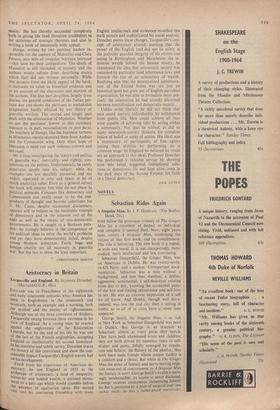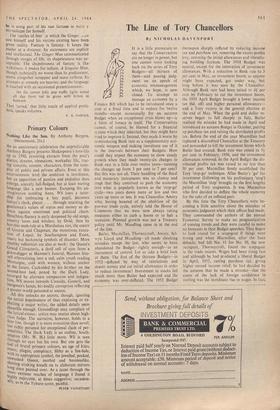NOVELS
Sebastian Rides Again
A Singular Man. By J. P. Donleavy. (The Bodley Head, 21s.)
JUST below the grotesque comedy of The Ginger Man lay a statement of despair so individual and complete it seemed final. Now, eight years later, comes A Singular Man, confirming the virtues of that first book, and its completeness. The title is betraying. The new book is a repeat, in style and mood. It is, not unexpectedly, more studied, more intellectual and less convincing.
Sebastian Dangerfield, the Ginger Man, was an American in Dublin. He was twenty-seven, ex-US Navy, and a student. Unimportant docu- mentation: Sebastian was a man without a background, and less than stateless; a drifter, aggressive, sentimental, a self-destroyer existing from day to day, knowing the occasional panic of the lost and finding reassurance and self-love in sex. He was an extreme expression of a self we all know. And Dublin, though well docu- mented, was less the real city than a setting in limbo; so to all of us cities have at some time appeared.
George Smith, the Singular Man, is as rich in New York as Sebastian Dangerfield was poor in Dublin. But George is as insecure as Sebastian; almost at every point they match. They have both abandoned wives and children; they are both driven by nameless fears to self- disgust and panic, fitfully assuaged by copula- tion and fellatio, the flattery of the phallus; they both have male friends whose deeper futility is a comfort and a threat. But while in The Ginger Man the sense of fantasy and nerve-tearing nega- tion arose out of concreteness, in A Singular Man the fantasy is overt. George Smith's wealth is seem- ingly inexhaustible; its source is never disclosed. George receives anonymous threatening letters; his flat is protected by a door of surgical steel two inches thick: he has a bullet-proof motor-car; he is using part of his vast fortune to bui'd a nunisoleum for himself.
the 'castles of fear' in which the Ginger ...an saw himself and his victims existing have been given reality. Fantasy is fantasy. It keeps the reader at a distance. Its statements are explicit and intellectual. The Ginger Man communicated through images of life; its shapelessness was ac- ceptable. The shapelessness of fantasy is like wilfulness; it makes for tedium. A Singular Man, though technically no worse than its predecessor, seems altogethe'r scrappier and more verbose. Its attempts at comedy are heavier; and the language IS touched with an occasional pretentiousness:
On the corner lolly pop traffic lights tasted all day from red to green with lemon in between.
That 'tasted,' that little touch of applied pretti- nesS, speaks volumes.
V. S. NAIPAL.11..







































 Previous page
Previous page